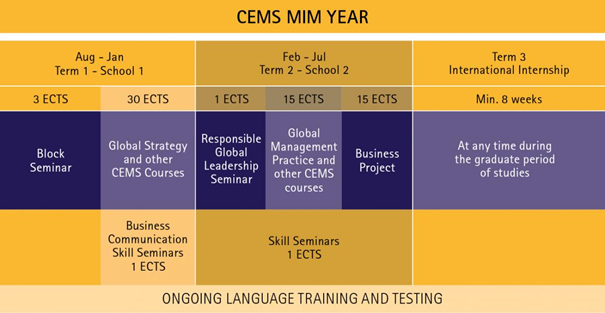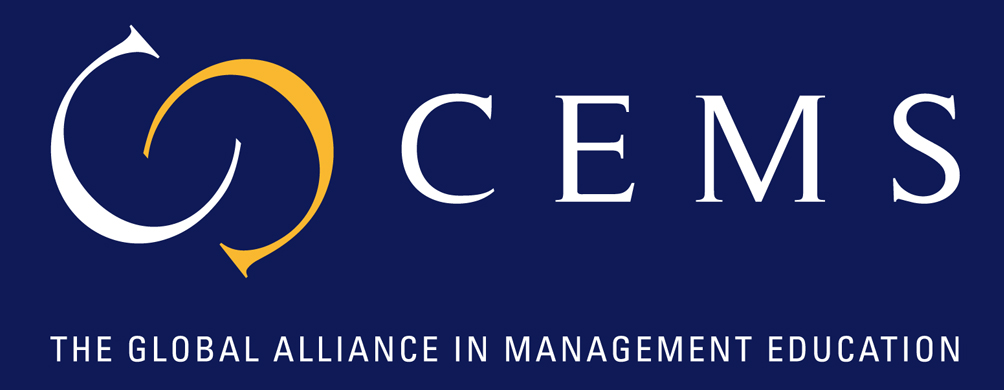CEMS International Business Training
The Corvinus-CEMS business training is a direct path to an international career. The one-year training not only provides a second degree, but also a number of international opportunities in addition to your master’s degree – and does not require an extra year. In the following paper, we have compiled the most important information about the business training being launched at CEMS Corvinus.

What is CEMS?
CEMS (known under its full name as The Global Alliance in Management Education, formerly the Community of European Management Schools) is an international collaboration between universities, business schools and NGOs. From Hungary, only Corvinus is a member of the international alliance.
One Hungarian and one international degree in two years
Are those two years worth it for a Hungarian master’s degree? Or is it better to continue my master’s degree abroad? Many ask this question – quite rightly so. However, there is a training at Corvinus where both are possible at the same time.
The CEMS Master’s in International Management (MIM) is a one-year, international business training that can be completed in parallel with a traditional master’s degree. At the same time, CEMS MIM is not only a further development of the original master’s programme, but also offers another internationally recognised degree in addition to the Corvinus degree.
The international degree in this case does not only sound good, but also provides practical knowledge. Students must spend one semester at a foreign CEMS partner university. An eight-week internship abroad also contributes to the international experience.
The second semester of the training can be completed at Corvinus, where they can learn, among other things, responsible international management and participate in international business projects. The CEMS master’s programme was developed by academic and business leaders to combine university education and practical management training.

Structure of CEMS MIM training. Students are free to choose which semester they complete at Corvinus and which at a foreign partner university. The international internships can be completed at any time during the training.
Anyone who studies in one of the following Hungarian-language Corvinus master’s programmes can apply for CEMS MIM: Supply Chain Management, Business Informatics, Marketing, Finance, Accounting, Tourism Management, Business Development, Management and Organisation, and Regional and Environmental Economic Studies.
You can also apply from the Marketing, Finance, Business Information Systems, Business Administration, International Economy and Business, Regional and Environmental Economic Studies, and International Taxation English language degree programmes.
The application period falls in November of each year, and training begins in September of the following academic year.
It is also at the forefront of international rankings
The CEMS international training has been at the forefront of several international rankings. It was ranked eighth in both the Financial Times and The Economist’s 2019 rankings and in the QS World University Rankings of 2020 for business trainings. CEMS training ranks 13th in the Financial Times 2020 rankings.
International opportunities in 75 countries around the world and placement within 3 months
After graduation, the next step for everyone is employment. 97 percent of CEMS graduates can find a position within 3 months. However, this does not only mean a domestic career, as 82 per cent of CEMS Alumni have worked abroad in several countries.
Another advantage is international networking. The CEMS students have found positions in 75 countries around the world, and the community is still active even after graduating from the classroom. The CEMS corporate partners include more than 70 multinational companies who are happy to employ CEMS students. The domestic and foreign semesters were developed jointly with companies, and the Alumni Mentorship programme helps students find employment abroad.
What are the components of CEMS MIM training?
- International experience: foreign semester + internship abroad
- Skill seminars: skills development programmes held by companies
- Business project: solving a real business problem brought by companies, in cooperation with companies
- Global alumni network: alumni mentor programmes help young people throughout their careers
- CEMS corporate partners: 70+ multinational companies belong to the CEMS alliance who are happy to employ CEMS graduates
How much does it cost?
There is no separate tuition fee for the Corvinus CEMS programme. However, there are other costs, these are the registration fee (€ 100), the block seminar fee (€ 300) and the Global Citizenship fee (€ 100).
There is no tuition fee during the foreign semester either, however, the cost of living may vary from country to country. Erasmus and Campus Mundi scholarships are available for this within Europe. Outside Europe, however, there is no guaranteed livelihood support.
When and how to apply?
The CEMS MIM one-year training starts in September each year, and you can apply in November of the previous year. Accordingly, the training normally falls on the second year of the master’s programme, i.e. the third and fourth semesters.
In the case of a cross-semester master’s degree programme, the training falls on the second and third semesters or the fourth and fifth semesters and must be applied for in November of the previous year. In all cases, an active legal relationship with Corvinus is a condition.
In 2020, the application period will fall between November 9-20, and the admissions interviews or Assessment Centre will be held between 11-22 January 2021. Prerequisites are a bachelor’s degree with a grade point average of at least 3.5 and a Corvinus master’s degree relationship, as well as a special advanced English language exam. The language exam is not required if the student completed the bachelor’s degree programme on an English-language business training of the Corvinus University.
You can read more about the requirements and the admissions process on this page.
How does this affect the traditional master’s degree programme?
The CEMS MIM takes place in parallel with the traditional master’s degree programme. CEMS subjects are accepted as optional subjects in each master’s degree programme, and other subjects can be recognised based on the equivalence tables.
The CEMS trainings include Decision-Making Skills, Corporate Sustainability and CSR, Technological Innovation and Knowledge Management, but a climate change strategy role-play is also a part of the spring semester (the list of subjects can be viewed here).
The results of CEMS subjects may also appear in the master’s degree average, but only if the given CEMS subject is recognised in the master’s degree programme. A total of 66 credits must be completed during the two semesters, the breakdown of which can also be seen in the figure above (ECTS=credits*). There is no separate dissertation, however, it is mandatory for students to complete a language course from a third language or to take a language exam.
*What is ECTS?
The European Credit Transfer System (abbreviated as: ‘ECTS’) is an administrative procedure for ensuring that knowledge acquired at another (foreign) university is accepted by the student’s own university. The credits of the acceding countries are included in the degree in the event of 75% equivalence. (source: felvi.hu)
The original article can be read on the Közgazdász Online interface.
